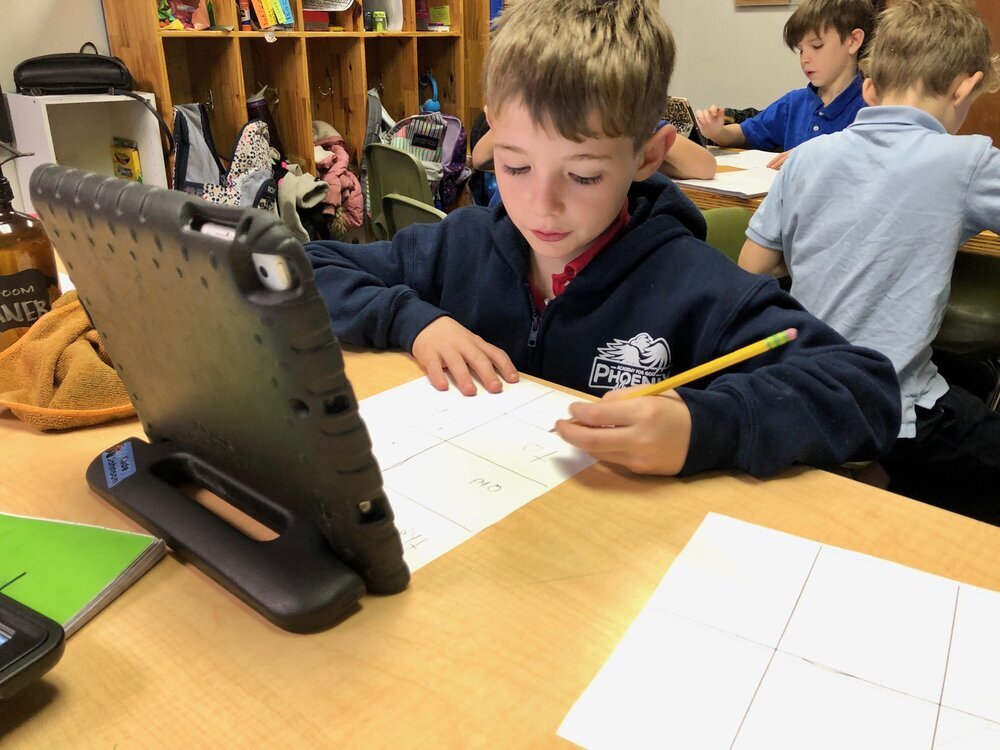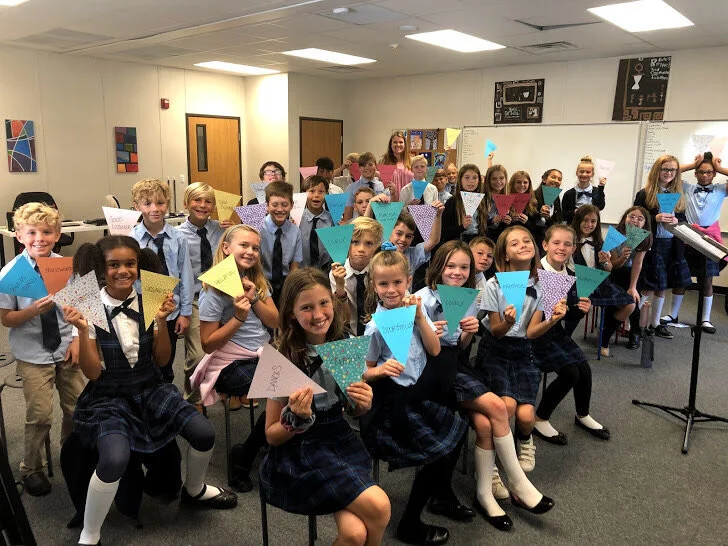Mixed-Age Learning Activities Boost Patience and Cooperation
In the Specifics B classroom we’ve been doing some mixed-age activities, which focus on getting to know some younger students better. In my homeroom class (“India”), students range from ages 9-10, while the Tanzania/South Korea students are just a year younger at 8-9 years. All these homerooms fall within the ‘Specifics’ level.
Written by Ms. Rebekah Davis, Specifics Level Lead Teacher
In the Specifics B classroom we’ve been doing some mixed-age activities, which focus on getting to know some younger students better. In my homeroom class (“India”), students range from ages 9-10, while the Tanzania/South Korea students are just a year younger at 8-9 years. All these homerooms fall within the ‘Specifics’ level.
Students write and present a puppet show together as forum for learning more about their classmates.
On the first day back to school, students were eager to share about their winter breaks. Mrs. Benoit and I partnered up and assigned each India student a younger partner from the Tanzania class. They interviewed each other about their breaks and prepared to present to the whole class what they had learned from their partner. Their creativity was highly entertaining! Two students chose puppets as their form of presenting, and they proceeded to do a live show with Lincoln the Pig asking Walker the Cow about his Christmas vacation. My favorite question to Walker the Cow was, “What did you eat for Christmas dinner.” The ironic reply from the cow, “My favorite, Beef Brisket!”
This kind of mixed-age activity is highly recommended by experts, encouraging gentleness and patience in the older students, as the younger ones learn by watching and imitating their older peers. (CLICK HERE for more info) I love to set up opportunities for my students to engage both older and younger students!
Teaching Students, Not Classes
Why make education monotonous and repetitious when the students receiving it are so diverse? There’s a saying our Headmaster, Gregg Garner, taught us: “teach students, not classes.” When we teach classes, the content runs the high risk of becoming repetitive and monotonous for the students and for the teachers. And I get it, the teacher needs to get through all the material...whether the students were ready for it or not.
Written by Mr. Derek Bargatze, Generals Level Lead Teacher
Why make education monotonous and repetitious when the students receiving it are so diverse? There’s a saying our Headmaster, Gregg Garner, taught us: “teach students, not classes.” When we teach classes, the content runs the high risk of becoming repetitive and monotonous for the students and for the teachers. And I get it, the teacher needs to get through all the material...whether the students were ready for it or not.
However, a teacher who teaches students can accomplish the same goal, but recognizes that students are different. I have students that can read a word off the white board and never forget it. They have a better memory than I do. I have other students who can’t read those same words, but can draw a beautiful and realistic portrait of themselves. I have students that get overwhelmed emotionally from a conflict at lunch and just can’t bring themselves to focus in the next class. At the same time, I have a student who is completely unaware they caused that student to be so upset. Every student is different, and to teach them like they’re the same is doing my students a disservice.
A teacher’s job is to be able to speak the “learning language” of every student. I think of a few Bible verses every time I think of “teach students, not classes”: Ephesians 2:10 - “For we are his workmanship, created in Christ Jesus for good works, which God prepared beforehand, that we should walk in them.” Also, Isaiah 64:8, “Yet you, LORD, are our Father. We are the clay, you are the potter we are all the work of your hand.” God cares about our development as human beings, first and foremost. Before we concern ourselves with completing our curriculum (which is important), we must give attention to the beautiful students God has given us the privilege to teach. Part of caring for them is teaching in a way they can understand.
Elementary reading courses are fluid so that students are able to learn at an individual pace. Games and hands-on activities in the classroom make learning fun and inviting for our younger students.
The Theory of Multiple Intelligences by Howard Gardener, suggests “that each human being is capable of seven relatively independent forms of information processing, with individuals differing from one another in the specific profile of intelligences that they exhibit.” Vygotsky’s Theory on the Zone of Proximal Development teaches that students learn at a different pace and teaching done well makes room for students to learn at their pace alongside an educator, tutor or a more competent peer. Both of these philosophies are incorporated into the Academy’s paradigm for education.
What I love about the Academy for G.O.D. is that we make these modifications to our daily class schedules for all our students. Our Language Arts block looks like students excited to be in a class they can thrive in, and when they’ve mastered their benchmarks, they can move to a different and more challenging Language Arts class. The same goes for our STEM and Creative Arts courses as well. Students don’t leave their age mates for the entire day, but just for the class period and return right back to their homeroom for breaks (which our students have FIVE breaks in their day). We have observed that our students love learning because they are taught by teachers that teach in ways they learn. If a student needs to touch and move letters, then that’s what they get. If a student wants to write down word for word, then they can do it. If a student wants to write a sight word and then perform the action because it helps them learn it, then that’s what the student is doing. It’s simply a great place to learn!
Sources:
1. Gardner, H., & Hatch, T. (1989). Educational Implications of the Theory of Multiple Intelligences. Educational Researcher, 18(8), 4–10. https://doi.org/10.3102/0013189X0180080042. Ryan, K., Cooper M., J., & Tauer, S. (2013). Teaching for Student Learning: Becoming a Master Teacher. Belmont, CA: Linda Schreiber-Ganster.
Sacred Education
Last Sunday evening, I was trying to get my five kids (4-13 yo) to get focused while we sat in our living room for a small time of worship. Not surprisingly, they were wiggly, giggly, and basically like they normally are in that space. What can you expect, they’re kids right? At the same time, what should I expect from kids in that kind of moment?
Written by Mr. Rob Muñoz, K-6 Vice Principal
Last Sunday evening, I was trying to get my five kids (4-13 yo) to get focused while we sat in our living room for a small time of worship. Not surprisingly, they were wiggly, giggly, and basically like they normally are in that space. What can you expect, they’re kids right? At the same time, what should I expect from kids in that kind of moment?
Dressed in their formal attire, students gather for chapel every Wednesday morning. Students receive biblical teaching from a variety of their teachers and often activities that reinforce the value being shared!
In the midst of trying to settle my thoughts and teach them a new worship song, I grew impatient. I put down the guitar for a moment, and gave the kids my dad stare (you know, the this-is-about-to-get-serious look). The conversation with them that followed made me think more deeply about the lack of understanding about what is ‘sacred’ among kids these days.
According to research, Generation Z (anyone born after 1994) is the least religious of the generations preceding it. For kids, that means less going to church, less youth groups, less spaces for meeting and interacting with one another and the Lord.
So I told my kids, “Look, I’m not upset. I do want us to have some fun, but I also expect that when we worship the Lord we focus and ready ourselves to interact with the Lord in his Spirit, which makes even this living room…set apart, and sacred really.” The kids, while mostly quiet and trying to figure me out, sat up, engaged, and started to make connections with expectations on their behavior and attitudes during worship times at their school (the Academy) and times in prayer we have had at home.
Mr. Muñoz, with the assistance of some of his former students, lead worship for the entire student body during a school wide chapel service.
It made me think how Christian parents and educators need to be intentionally defining what sacred is for children, especially when it comes to spaces where they interact with the Lord. This is why I am so thankful for our Wednesday “Spiritual Emphasis Days” at the Academy.
From kindergarten through high school, Wednesdays are centered around worship in song and hearing the word of God during chapel. Students also dress in their formal day clothing showing the ‘set apartness’ of the day. Younger students engage in classes like Heroes of the Faith and Jesus Movie, connecting biblical values to historical characters and popular media. Collaborative classes like Exploratory Hour and Games give students an opportunity to practice themes they are introduced to each week like perseverance, kindness, and cooperation. The older students spend significant time learning to worship in bands with expert worship leaders as instructors. Extended chapel times allow them time to be guided in the development of their own spirituality. It is all quite the effort on the part of the staff and volunteers, but well worth it.
Exodus 3:4 When the Lord saw that he had gone over to look, God called to him from within the bush, “Moses! Moses!” And Moses said, “Here I am.”5 “Do not come any closer,” God said. “Take off your sandals, for the place where you are standing is holy ground.”
Students and teachers share a moment of worship together on the last day of the fall 2019 semester. These are some of the most prioritized, sacred moments of our school year!
One of my great hopes is that the Academy will be a place where children can be educated in how to keep the name of the Lord and our interactions with Him a sacred space.
Fall 2019 Semester Reflection
As the semester and calendar year comes to a close, I find myself reflecting on the goodness of the Lord. As an educator, I’m blessed to work for an institution that does what it says it will, and is preoccupied with the whole child and not solely a test score. As a parent of a student at the Academy, I am blessed to know that the Lord has placed adults in the life of my child that will help him grow into a man…
HOLISTICALLY EDUCATING CHILDREN TO BECOME RESPONSIBLE, KIND AND ETHICAL NEIGHBORS; COMPETENT PERSONS, GLOBALLY CONSCIOUS, AND HISTORICALLY RELEVANT.
Written by Mr. Alex Castro, Principal
Mr. Castro welcomes visitors to one of our largest school events of the year: Grandparents Day.
As the semester and calendar year comes to a close, I find myself reflecting on the goodness of the Lord. As an educator, I’m blessed to work for an institution that does what it says it will, and is preoccupied with the whole child and not solely a test score. As a parent of a student at the Academy, I am blessed to know that the Lord has placed adults in the life of my child that will help him grow into a man that will one day walk from this campus and live out the expectations of our mission statement.
This semester I’ve seen children resolve conflict by using mediation, fears being cast aside when having to engage in new content, new technology used to present problems and solutions to administration, and much more. I have also had the pleasure of being spoken to by students who can truly engage in conversation with adults. There are so many things that have happened this semester that have both amazed me and sparked a new passion.
Whether participating in a PTO fundraiser, volunteering in the classroom, or showing up for a campus tree-planting day as seen in this photo, Academy parents are a blessing to our students and staff!
Having worked in public education, I am constantly reminded of the contrast between our school and others. One area that is overwhelming is parental support. The willingness of our parents to partner with what the Academy values is one area that I can personally say is a strength of our school. It is astounding to see the support through events, donations, and teacher appreciation. It is with this that I offer a huge THANK YOU to all parents who have participated in partnership with us in so many capacities this first semester. Thank you for entrusting us with the education of your children. We are committed to holistically educating your children in becoming responsible, kind and ethical neighbors; competent persons, globally conscious, and historically relevant.
Academy Staff Instruct Educators in the Philippines
Written By Alison Sherrod
In 2011 I spent six months teaching Kindergarten at a rural barangay (neighborhood) school in Sariaya, Quezon, Philippines as part of a study abroad program with the Institute for G.O.D. Being in a crowded classroom with 30 five year old children who primarily spoke Tagalog was not the most comfortable experience in my life, to say the least.
Alison teaches math in a rural classroom of 30 kindergarten students in Sariaya. Quezon in 2011.
Furthermore, because the children were too young to travel alone, many of them coming from the coast, the mothers were also present, peering through the open windows, observing my cross-cultural class management skills, delighted at the scene while giggling with one another over the “American teacher”. Fast forward 8 years later to August 2019 when I visited the Philippines for a week-long leadership summit conference with the Association for Christian Schools International (ACSI) Global. My perspective on education in the Philippines has grown much deeper after spending the past 6 years as part of the school administration and start-up team at the Academy for G.O.D. I have learned lessons in school administration and a holistic approach to education for children that can be transferred into any culture, and that’s just what I was blessed to teach at the conference last month.
Leafa Vagatai and Alison Sherrod were blessed to be invited to the ACSI Summit Leadership Conference, hosted by ACSI Philippines Director, Ces Tajales and ACSI Global Vice President, Dr. David Wilcox.
Dr. David Wilcox speaks to hundreds of Filipino educators and school leaders on the current generation and the enduring values that should be present in Christian education curriculum.
My teammate and co-worker at the Academy for G.O.D. Leafa Vagatai and I were invited to attend and facilitate breakout sessions at the ACSI Convergence Conference in Palo, Leyte with over 400 Filipino school leaders and teachers. The annual leadership summit is held in a different location throughout the Philippines each year, and this year’s conference just happened to be in the same town as our ministry hub. Our week was filled with insight from Filipino educators and leadership from ACSI Global, including Dr. David Wilcox, Vice President of the Asia region.
It was after my experience in 2011, that the Lord impressed upon my heart a need for accessible, alternative Christian education in the Philippines. I was moved by some of my kindergarten students in Sariaya who endured physical hardship, or others who had social-emotional challenges, and several other students who could only attend school on certain days due to familial obligations. The opportunity for quality education is not available to all. A couple of years later when the Academy for G.O.D. began in Old Hickory, TN, I learned what could be possible in children’s education under the direction of our Headmaster, Gregg Garner. Other regional team members were also involved like Leafa with the kindergarten program, Craig Duffy with upper-elementary students, and Michelle Madron with special needs services. The Lord is continuing to connect all of our work at the Academy with what we hope to see in the Philippines.
It was a blessing to be among so many Filipino Christian educators in Palo last month, to hear their stories and connect with their experiences in the classroom and working with parents. Many of the private school teachers in the Philippines receive less pay than public school educators as they do not receive government funding, so they consider their work ministry, a service of teaching God’s children.
Academy elementary teacher, Leafa Vagatai, facilitated workshops on early education and music as a tool in the classroom. Leafa has over a year experience teaching in Filipino schools.
Please join us in prayer for these men and women in the Philippines and around the world who give themselves to this work each day. Opportunities like the Convergence Conference are a special time for these individuals to collaborate, learn from one another, and develop friendships with those who are like-minded in terms of philosophy and motivation. God willing, some of the educators we met last month will become wonderful resources and co-laborers for our schools in the Philippines as we look into the coming years in faith!






















